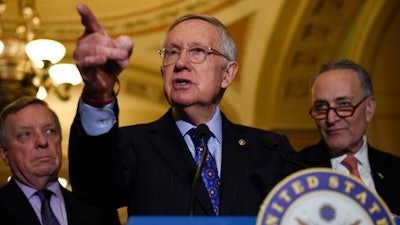
WASHINGTON (AP) — Congress sent President Barack Obama bipartisan legislation Wednesday to beef up research on cancer and other diseases, battle drug abuse and speed government approvals of pharmaceuticals and medical devices.
By 94-5, the Senate sent the measure to President Barack Obama for his certain signature. The House easily approved the legislation last week.
The measure plans $6.3 billion over the coming decade, including $1.8 billion for a cancer research "moonshot" strongly supported by Vice President Joe Biden, whose son Beau died of the disease. It also envisions giving states $1 billion over two years to prevent and treat abuse of opioids and other addictive drugs like heroin, and it reshapes federal mental health programs.
The vote came as lawmakers raced toward adjourning Congress for the year by working on a spending bill that would boost anti-terror and disaster aid accounts. It would also grease the way for retired Gen. James Mattis to be President-elect Donald Trump's secretary of defense.
Stopgap spending legislation unveiled Tuesday evening would provide $10 billion for overseas military and diplomatic operations, while southern states like Louisiana, North Carolina, and Texas would receive the bulk of a $4.1 billion disaster aid package.
The temporary spending measure, scheduled for House and Senate votes later in the week, would keep the government open through April.
It would also prevent the government from shutting down this weekend and buy several months for the new Congress and incoming Trump administration to wrap up more than $1 trillion worth of unfinished agency budget bills.
Under current law, Congress would need to pass legislation next year to grant Mattis an exception from a law that requires a seven-year wait for former members of the military to serve in the post. Tuesday's provision would speed up action on the waiver, though Democrats could still filibuster it. Democrats were upset by the move but signaled that they would not try to block the stopgap measure — and spark a government shutdown — over it.
The bill would also deliver $170 million in long-delayed help for Flint, Michigan, to fix its lead-tainted water system.
Democrats complained the GOP spending measure shortchanged New York City by giving it just $7 million for police overtime costs for protecting Trump, who lives in midtown Manhattan. And they complained that a provision to help retired Appalachian coal miners keep their health benefits for a few months was woefully inadequate.
The bill attracted attention as the final legislative locomotive to leave the station before Congress closes shop this year. Nothing else on Capitol Hill's agenda had the power to tow other unfinished legislation into law.
The White House and Main St. Republicans were denied in a bid to revive the Export-Import Bank's ability to approve export financing deals exceeding $10 million. But the trucking lobby won permanent relief from recent Transportation Department rules mandating more rest and overnight breaks for long-haul drivers.
The $4 billion disaster package contains $1.8 billion for community development grants, much of which would go to rebuild homes damaged or destroyed by devastating summertime floods in Louisiana, Hurricane Matthew, and other disasters. Another $1 billion would go to the Army Corps of Engineers for flood and coastal storm protection projects and another $1 billion would repair damaged highways.
The $10.1 billion provided for Pentagon and State Department anti-terror efforts gave the Obama administration most of its $11.6 billion request.
One major dispute centered on protecting health care benefits for about 16,000 retired union coal miners facing the loss of coverage on Dec. 31. Both Democrats and Republicans from Appalachian coal states pressed for help for retired miners and their widows. House Republicans resisted offering help for the union members and Senate Majority Leader Mitch McConnell offered only a short-term solution through April 28.
Sen. Joe Manchin, D-W.Va., protested that McConnell's fix would only last for a few months vowed to push for a permanent solution. He's vowing to block any Senate effort to move quickly on unrelated legislation until the miners' fight was settled.
At issue are health benefits for retirees whose companies declared bankruptcy in recent years.






















